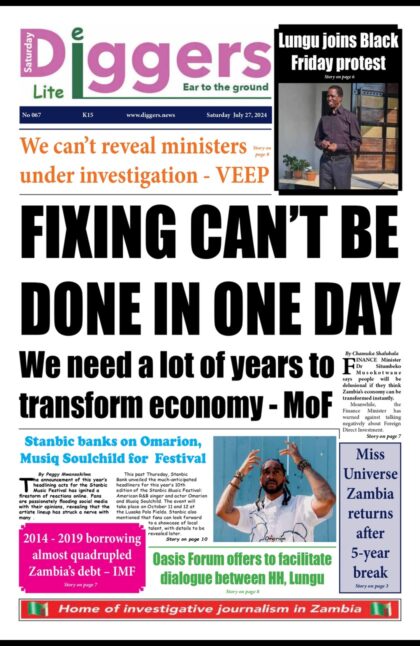Zambia Association of Manufacturers (ZAM) vice-president Chipego Zulu has called for immediate discussions around the cost of electricity to ensure they are not prohibitive to a point of grounding businesses.
And Zulu says the recently announced fuel price increase and imminent electricity tariff hike will inevitably result in increased end user prices of locally manufactured products as significant increases in the cost of production will be recorded.
She said in an interview with News Diggers! that private sector could only drive the country’s economic growth if they produce efficiently and at a productive rate.
“So there is definitely need to relook at the discussions around electricity and the cost of electricity and make sure that it’s not so [prohibitive] as to make business fail to operate. I think at the point that we are now, we definitely need the private sector to drive growth and that is ultimately anchored in our ability to produce efficiently and at a productive rate,” Zulu said.
She said with the recently hiked fuel prices, increases in the cost of basic commodities manufactured in Zambia would follow.
“…ultimately, when we see increases in the cost of fuel, the cost of energy, electricity, it does translate into a higher cost for the final product and always I think our input on this is that we need to be able to ensure that locally manufactured products still remain competitive, they still need to remain competitively priced to ensure that the Zambian consumer is able to purchase the locally manufactured products. As you know, when you are buying Zambian, we are ensuring that the revenue that we are generating is being spent within the country and this is necessary to stimulate economic growth,” Zulu explained.
“So ultimately, the manufacturing sector is grappling with significant increases in the cost of production with those of course arising from the power deficit that results in a high level of load shedding and even when you discuss load management, there are challenges with the schedules thereafter and this leads to an increase in the cost of production. The discussion now is in and around mitigating that factor such as the importation of power but now recently, we heard about the increase in the fuel prices. As you know, with load shedding, we tend to address that by investing in diesel powered generators so the increase in the cost of diesel or fuel prices also now will contribute to an increase in the cost of production.”
She called on authorities to look at the increase in the cost of the production and ensure that the trend does not cripple the country’s manufacturing sector.
“Unfortunately, we are also hearing that discussions are ongoing with regard to the final rate that the tariffs are likely to increase by if we are importing power from South Africa and it’s led to open a more serious discussion now around what that rate is. Because ultimately, if the cost of production is so high that manufacturers are unable to cope, that results in either very highly priced locally manufactured products or even the closure of some manufacturing firms. So this is a significant concern and we do urge the authorities to ensure that they look at the way the costs of production are increasing, we are also looking to ensure that the rate of increase is not so substantial as to affect the capability of businesses to cope and function,” said Zulu.








